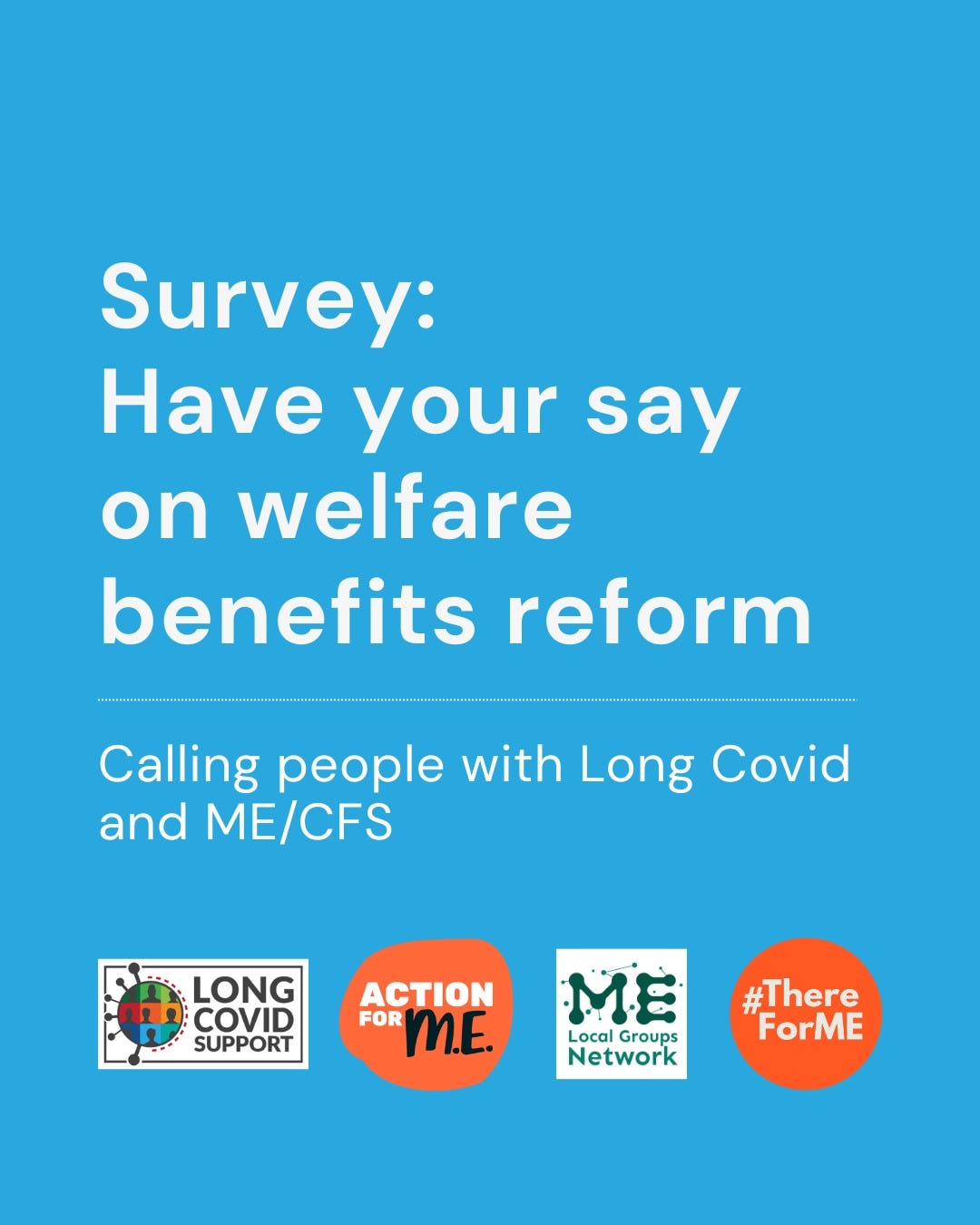Campaign Update #18: Exploring evidence-based advocacy
Lately at #ThereForME HQ we’ve been thinking a lot about evidence-based advocacy. Influencing change is about a lot more than evidence, but we think it’s where good advocacy begins.
Recently, we’ve been exploring what this could look like in practice. For example, we’ve collaborated this year with our friends at CrunchME - whose advisory board Karen has recently joined - to better understand the UK research, healthcare and funding ecosystem around ME and Long Covid.
This week we’re sharing some of the ways we’ve been using evidence as part of our advocacy work.
New survey: understanding the impact of welfare reforms
Our readers will most likely already be aware that the UK government is proposing changes to welfare benefits that could have a serious impact on people living with ME and Long Covid. Many of us are understandably concerned about what the changes will be and what they mean for us.
Last week we put out a survey - in partnership with Long Covid Support, Action for ME and ME Local Network– aiming to gather evidence about how the proposed changes are likely to impact the community. The survey is part of a collaboration with the All-Party Parliamentary Groups (APPGs) on Long Covid and ME, who are keen to better understand some of the key concerns around the proposed reforms.
If you receive PIP, UC or ESA benefits, or care for someone who does, we want to hear from you. The survey takes 5-10 min to complete and is open to residents of England, Wales, and Northern Ireland (since the survey mainly focuses on PIP, we’ll be sharing a separate survey for Scotland soon).
Your responses will support our advocacy to the government to highlight concerns and potential solutions. To reassure those considering taking part, the full survey data will be viewed only by the research team, who will summarise key trends in advocacy materials. The responses received by 24 April will inform a briefing for the APPGs, but we’ll be collecting responses well into May if you need longer to complete the survey.
This survey has also been endorsed by the following organisations: 25% ME group, Bury & Bolton ME/CFS & Fibromyalgia Support Group, Hope 4 ME Fibro Northern Ireland, Key Worker Petition UK, Long Covid Advocacy, Long Covid Kids, Long Covid SOS, ME Action UK, MERC PAG, Physios For ME, and Supporting Health Heroes UK, ME Association
Thank you to the 1,031 of you who have already helped to ensure the voices of people with Long Covid and ME are heard!
Rosie on Spotlight: evidencing the need for change
“People with ME, their carers and families are saying: how can you deliver a plan with no money assigned to it?”
Of course, evidence isn’t just about numbers. Telling stories of people who are affected can be a powerful way to evidence the need for change. In the last couple of weeks, Rosie Barrett spoke to BBC Spotlight about her sister, Alice, who suffers from Very Severe ME, and their family’s experience caring for her. We’re very grateful to Rosie for telling their story and advocating so strongly for her sister, as well as others affected by ME by drawing attention to our #FundThePlan campaign
The segment included part of Rosie’s #FundThePlan video as well as our #FundThePlan collage and reported on our campaign: “She and other families and patients are sharing their stories on social media urging the government to adequately fund its final Delivery Plan on ME.” For our most recent update on the plan, see Campaign update #17.
Advocating for evidence-based treatments
Needless to say, we also think evidence is crucial to develop effective treatments for ME and Long Covid, as well as to avoid people being exploited by sham ‘cures’.
Our very own Oonagh appeared on the BBC’s Con Or Cure last week, along with Long Covid Specialist Dr Melissa Heightman, talking about her experience with the Lightning Process.
Dr Melissa Heightman said she had “not seen any evidence that the Lightning Process helps to resolve the symptoms of Long Covid. [...] We consider Long Covid to be a physical illness and we can see from the science coming through lots of differences in a person who has Long Covid compared to somebody who doesn’t, so the idea that you could resolve your symptoms by changing your mindset to the illness doesn’t make any medical sense.” (The NICE Guideline for ME states that the Lightning Process should not be used as a treatment for ME.)
Presenter Ashley John-Baptiste highlighted one reason why we think it’s so critical that we invest in quality research and care:
“When there is no known cure for a condition, people become vulnerable to paying for expensive treatments and training programmes in the hope of finding the magic remedy.”
As we’ve said before: 1.3 million people in the UK are affected by ME and it’s time to get them the treatment they deserve. That means investing in the evidence base needed for safe, meaningful care.
Thanks as always to Adam aka Broken Battery for archiving all these clips.
We’ll see you next week.




Great piece again, thank you. So very disappointed to hear that ACE2 inhibitors referred to as a fad. I really wish all the amazing scientific communities could be given the same amount of funding that was afforded them to develop the covid vaccines and that the research was completed in a logical steped approach 🙏 If only one of those billionaires got long covid, they would solve it 👍not that I would wish this on my worst enemy 💙
Spot on about stories and evidence. Both need to be neatly woven together to make a compelling case. Thank you for what you do.